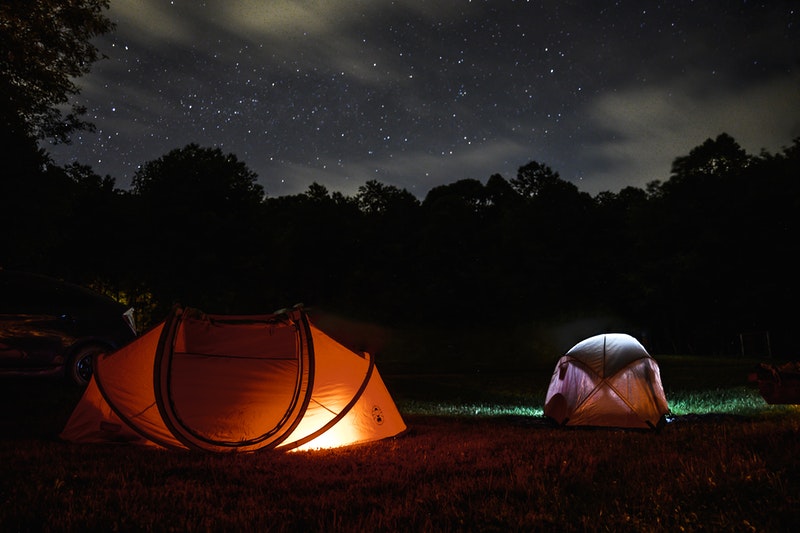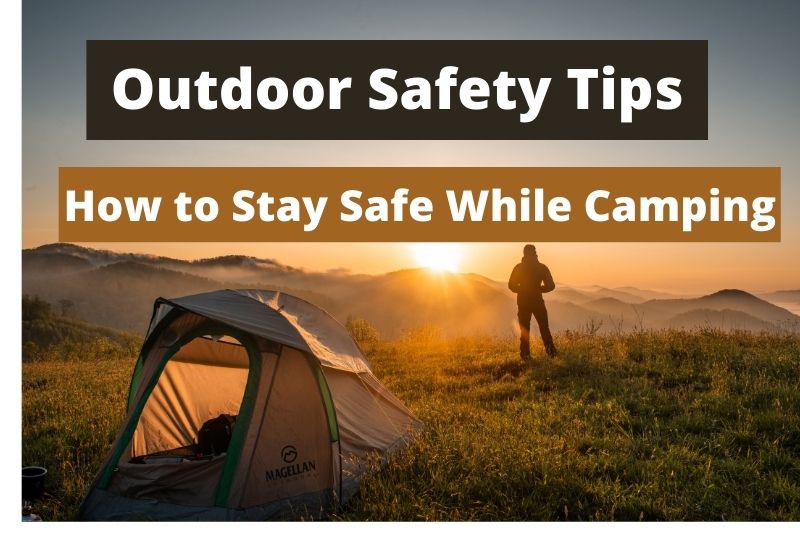Outdoor activities have become considerably more popular lately. An increasingly higher number of people are discovering the benefits and joy of connecting with nature at a personal level. As a result, discussions on outdoor safety and security are more urgent than ever. Hiking and camping can bring so much value to one’s life at a physical, mental and even spiritual level, but an outdoor experience can turn sour without proper preparation.
In this article, we’ll discuss some essential outdoor safety tips with an emphasis on camping. Without the peace of mind that comes with preparation and experience, it can be hard to enjoy the moment. So, how do you stay safe while camping? What can you prepare for the most common high-risk situations? Let’s dive in.
Always Check the Weather Forecast

When you’re spending the night in a tent, you’re very vulnerable to weather. Thus, checking the weather forecast should be the first thing you do when preparing for a hiking or camping trip. Don’t downplay the risks of weather changes. Severe weather events like storms, flooding or extreme heat can put you in life-threatening situations. When you’ve only experienced thunderstorms from the comfort of a house, it’s difficult to tell how dangerous and scary it can be to experience it outside, with only the fabric of a tent to protect you.
Although the weather can be fickle, regularly check local forecasts to know what is expected during the period you plan to spend outdoors. For higher accuracy, you should check the forecast several times during the day before and during your trip. In addition, there are several ways to minimize the risk of being affected by dangerous weather scenarios. A good tip is to never set up camp near rivers or in low-lying areas; sudden downpours can lead to flooding. Another crucial tip is to try to change to dry clothes as soon as you get wet or sweaty. Otherwise, you may run into the risk of hypothermia.
Beware of the Wildlife
Research your camping location in advance to get informed about the local wildlife. The same region can be more or less dangerous in this regard depending on the season, so in-depth research is crucial. You don’t want to come across a bear just as you’re pitching your tent. If there’s a population of bears in the region, you’ll have to arm yourself with pepper spray and stay vigilant. Store your food in the car or a different area of the campsite. In case a bear is attracted to the smell, it won’t come directly to your tent while you’re sleeping.
Besides bears, there are many smaller and much cuter animals like squirrels or racoons that will immediately take the chance to raid your campsite if they smell food. So, clean up every crumb after each meal, so the food scents won’t linger around your campsite. Always lock up your things tight. Another danger during the summer season comes from snakes. Although they don’t attack unprovoked, even the smallest snake can be dangerous. Always wear long pants and closed shoes even if you’re just hanging around your tent.
Prepare a Packing Checklist
The right gear and tools can keep you safe while camping, so prepare a checklist of essential items to have with you every time. In addition to your tent, sleeping bag, warm clothing, you will need these items: lanterns, batteries, fuel and matches. Many campers also carry hatchets or firearms. You can find rifle dealers online if you think carrying a firearm will make you feel safer. Just knowing that you have the right tool to escape a dangerous situation can give you the much-needed peace of mind to enjoy your trip.
Don’t forget to add first-aid supplies. Naturally, since camping locations are remote, finding prompt medical aid is difficult. In case something goes wrong and you have to self-treat an injury, you need good first-aid supplies and a bit of knowledge on how to use them effectively. Make sure your first-aid kit includes items for many types of injuries and sicknesses. Scratches and cuts are a common occurrence in a camping trip, so carry at least antiseptic medicine and bandages. If you are camping for several days in remote areas, prepare an emergency survival kit.
Follow Fire Safety Rules

One of the highlights of a camping trip is sitting around a campfire with your travel companions. However, fire is dangerous outdoors as it can easily get out of control if you are not careful. To avoid such a situation, learn about camping fire safety in advance. Before starting a fire, check which way the wind is blowing and keep your tent and all the gear at a safe distance. Make sure that the wind does not direct smoke and embers towards your tent.
When camping, you may need fire for cooking as well. If you use fuel to start the fire, ensure you are not using too much. Cooking over a strong fire can easily lead to accidents. Even a minor burn can ruin your trip. Once you’re done cooking, put out the fire with water and wait until it is completely extinguished. You don’t want a second of inattentiveness to cause a forest fire. Unfortunately, even a single ember can cause a damaging fire in certain weather conditions. It’s also recommended to avoid starting fires in areas filled with bushes or shrubs that burn easily. Because fire poses such a great danger, some national parks or campgrounds don’t allow campfires, so get informed about the rules.
Spending time outdoors can lift your mood, give you a serious boost of energy and make you more appreciative of the small things in life. To enjoy these benefits, you have to learn to accept the associated risks. With proper planning and research, you can minimize the risks and have a safe and fun time in the wilderness.
If there is one general tip you should follow that is to be aware of your actions and your surroundings at all times. As long as you are vigilant, you can react instantly to any danger in your immediate area and thus avoid serious consequences. The good news is that the more often you go hiking and camping, the more refined your intuition and survival instincts will become.

